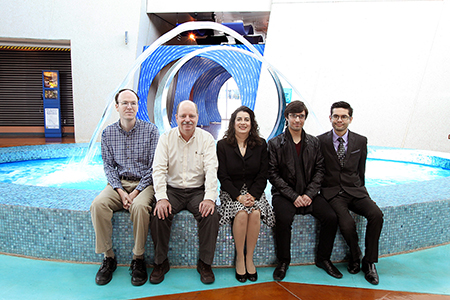By Daniel Perez
UTEP News Service
Water is a life-sustaining commodity with no substitute, and the demand for it only will increase alongside the world’s population. Institutions that monitor water use are researching ways to extend the water supply. Enter UTEP Professor of Economics Tom Fullerton.
Fullerton, Ph.D., has secured several external research grants that are part of the Border Region Modeling Project (BRMP) 2014. One is called “Improving the Accuracy of Water Demand Forecasts” for the Denver-based Water Research Foundation.

The noted economist, whose research specialty is econometric modeling and forecasting, recently started work on the two-year, $116,000 project that will examine the commonalities of water usage among municipal water utilities around the world. Data will come from U.S. utilities in El Paso, Fort Worth, Phoenix, Tampa and San Diego, as well as South East Water in Melbourne, Australia.
His applied research will include a large-scale survey into the current forecast practices employed by major water utilities, an examination into how the 2009 recession impacted water forecast accuracy, and will test whether or not econometrics methods – the use of statistics to describe economic systems – can be used to improve the reliability of water forecasts.
“There are questions that need to be asked that haven’t been answered in economic terms,” said Fullerton, who has studied water forecasting since 1999 and completed his first regional water research article in 2001. “The objective is to give analysts and managers involved in municipal water planning a better idea of current forecasting practices, and the difficulties posed by business cycle downturns.”
Fullerton’s work will help the El Paso Water Utilities (EPWU) to properly plan production and use of its scarce regional water resources, more accurately chart growth, maintain affordable water rates, and sustain the water supply. These factors will assist the City of El Paso to attract better job opportunities and build the region’s economy.
“His regional econometric model provides government leaders, agencies and private companies a tool to plan for the future,” said David Torres, an EPWU economist and a UTEP alumnus who studied under Fullerton.
New research is needed to better understand the evolving impact of conservation efforts and the shifts in demand, said Maureen Hodgins, research manager for the Water Research Foundation. She said Fullerton’s short-term forecasting will help utilities, especially those from smaller municipalities that rarely have access to these models, to set up demand and revenue limitations.
“The old rules of thumb are not holding anymore and climate change must be a factor,” Hodgins said.
Fullerton’s co-principal investigator on all these efforts is Adam Walke, a research associate economist at BRMP. Both will be assisted by two economics graduate students, Alex Ceballos and Alan Jimenez, are assisting Fullerton.
Ceballos, a native of Chihuahua, Mexico, has worked with Fullerton since 2012 when he was an undergraduate eager to start his graduate work. He earned his bachelor’s degree in business administration in May 2013 and plans to finish his Master of Science in economics in December.
The graduate student said this project lets him apply the econometric tools developed in class, and gives him a better idea of how economists work in the field. His duties include collecting and analyzing data, and helping to create a manual for short-term water demand forecasting.
“While a lot of research is conducted at the state and national levels, very little empirical literature was available for border metropolitan regions,” Ceballos said. “(Fullerton) recognized this theoretical lacuna and made a successful career in academia by filling that gap. As a result, every time I encounter a gap in the literature, I see it as a potential research project.”
The majority of the work will be done on campus, but there will be some travel involved as his team attends out-of-town conferences to explain their findings. The work should be completed by December 2015.
Additional funding came from UTEP’s College of Business Administration, Hunt Communities and El Paso Water Utilities.
This is the latest research grant for Fullerton and Walke, who also are working on three other forecasting projects valued at more than $70,000.
• They are finishing another water-related grant for EPWU, “Business Cycle Impacts on Municipal Water Usage.” He started in October 2013 and expects to share the results in September.
• Hunt Communities is funding Regional Forecast Accuracy, a continuation of economic research along the U.S.-Mexico border. The company plans to fund this study for several more years.
• The City of El Paso has asked the BRMP team to create the El Paso Municipal Revenue Forecast Modeling, which will help analyze the city’s 15 largest revenue sources and generate forecasts as part of the annual budgeting process at City Hall.